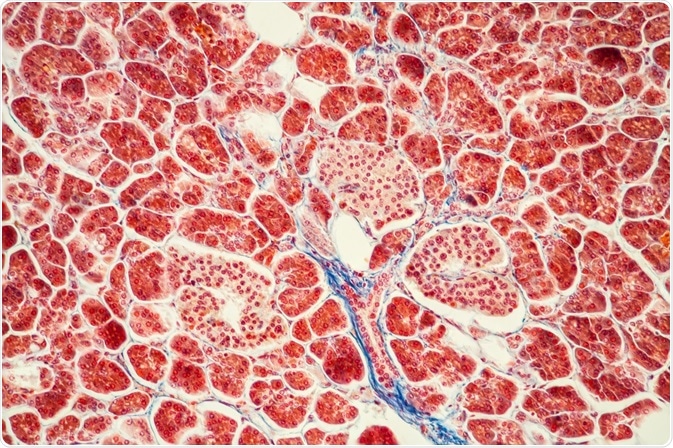Glucagon is a hormone that counter-regulates insulin and sustains glucose homeostasis to prevent hypoglycemia. The action of the two hormones is crucial to maintaining glucose homeostasis.
 Credit: Norbert Lange/Shutterstock.com
Credit: Norbert Lange/Shutterstock.com
Glucagon increases the production of glucose by increasing glycogenolysis and gluconeogenesis in the liver, and by reducing glycogenesis and glycolysis. The release of glucagon in response to food consumption depends on the type of meal that has been eaten. If a meal is rich in carbohydrates, blood glucagon levels fall to prevent an undue rise in the level of circulating glucose. When a protein-rich meal is eaten, the blood glucagon level rises.
Glucagon production
In a part of the pancreas called the islets of Langerhans, the precursor, proglucagon, is cleaved in specialized cells called the alpha cells by an enzyme called prohormone convertase 2 to become glucagon. In the nerve cells of the brain stem and in the intestinal cells, proglucagon is processed by prohormone convertase 1 to produce glucagon-like peptides 1 and 2, as well as other peptides. These peptides link to G-protein coupled receptors which have distinct responses.
Glucagon signaling pathway
When the blood glucose level is low, the pancreatic alpha cells secrete glucagon. When glucagon binds to its receptor, which is mainly located in the liver and kidney, it induces the receptor to undergo conformational changes. This causes heterotrimeric G proteins to be activated, mainly the Gs alpha subunit, which starts signaling to activate adenylyl cyclase enzymes.
This leads to the production of cAMP, which results in activation of the protein kinase A (PKA) pathway. In this pathway, PKA phosphorylates the enzyme phosphorylase kinase which in turn phosphorylates, and activates glycogen phosphorylase. The latter is the enzyme involved in the initial and rate-limiting stage of glycogenolysis where glycogen is broken down to produce glucose.
PKA activated by glucagon also prevents the production of glycogen because it induces the phosphorylation of the enzyme glycogen synthase, which is essential for the biosynthesis of glycogen.
Regulation of glucagon signaling
The enzyme 6-phosphofructo-2-kinase/fructose-2,6-bisphosphatase (PFKFBPase) is another essential enzyme involved in glucose metabolism that is activated by PKA. The kinase part of this enzyme enables fructose-2,6-bisphosphate (F2,6P) to be produced.
This in turn modulates the metabolism of glucose by activating phosphofructokinase and inhibiting fructose bisphosphatase. Phosphofructokinase is required in the glycolysis pathway and bisphophatase in the gluconeogenesis pathway. The phosphatase arm of PFKFBP transforms F2,6P into F6P. PKA phosphorylates the kinase, inactivating it, which leads to an increase in phosphatase activity. The subsequent decrease in F2,6P results in the inhibition of glycolysis with the promotion of gluconeogenesis.
Researchers also think the activation of PKA by glucagon triggers gluconeogenesis by affecting the levels of the enzymes glucose-6-phosphatase and phosphoenolpyruvate carboxykinase. Again, this is by the phosphorylation-induced activation of transcription factors or co-activators.
Insulin and glucagon
Last Updated: Feb 26, 2019